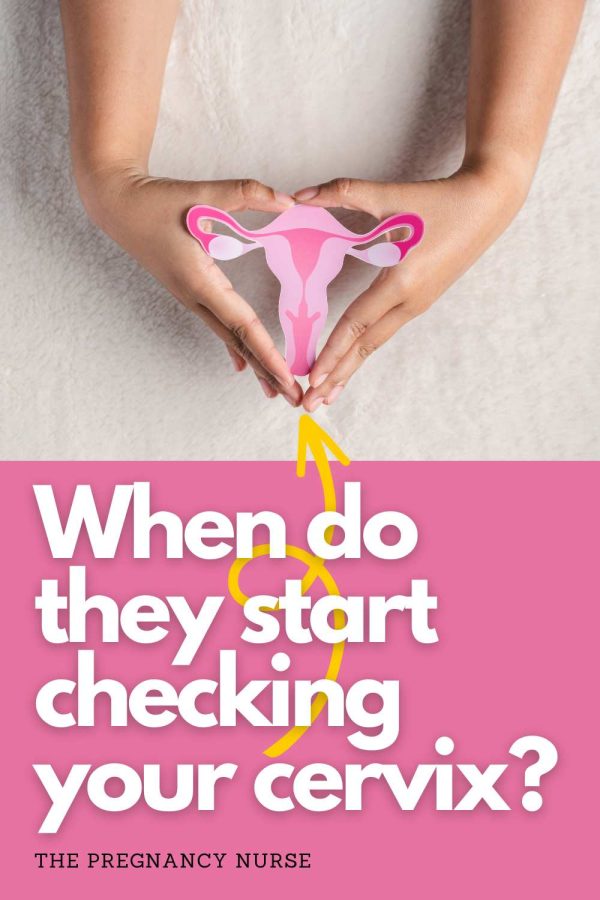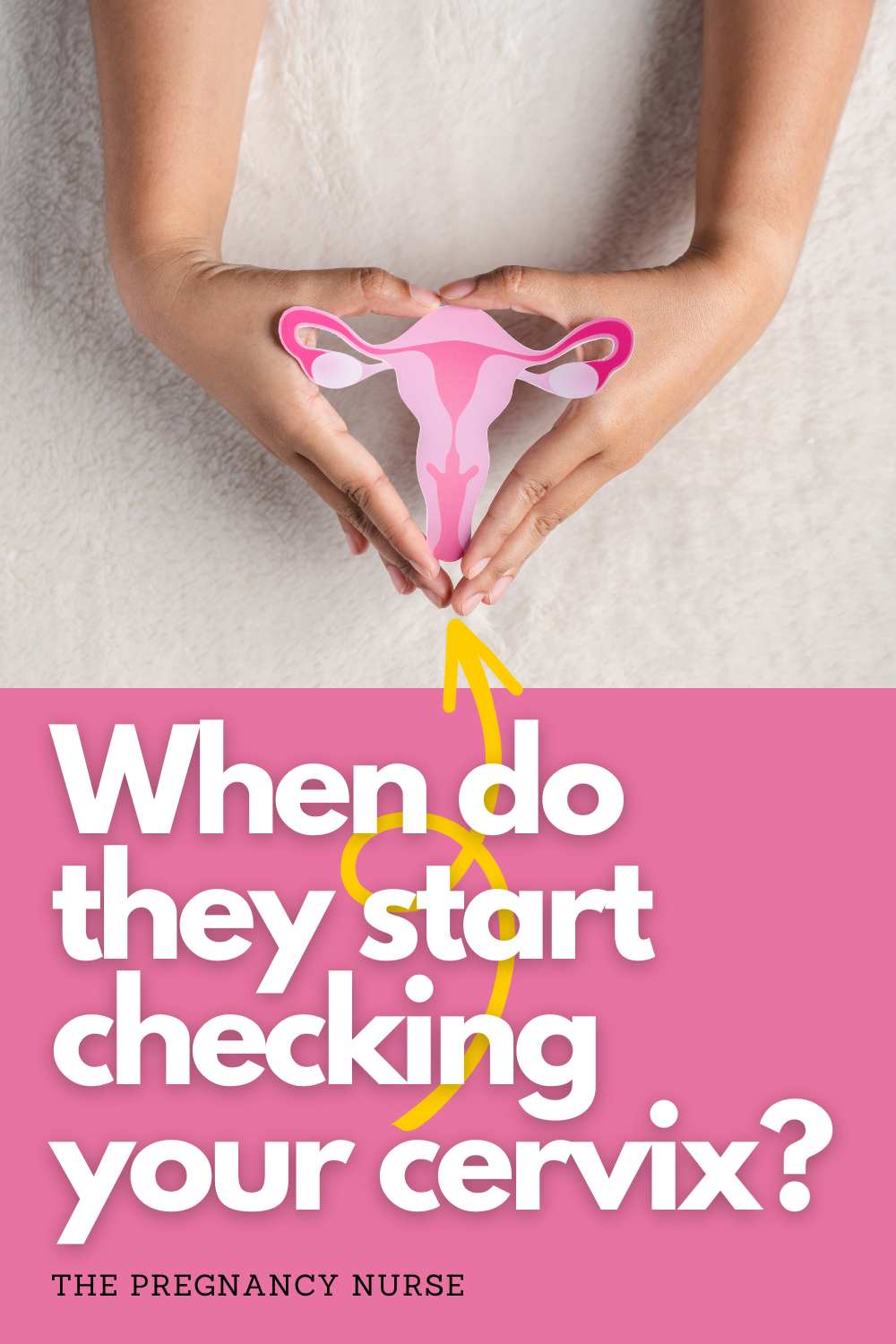While most pregnant patients do get a pap smear at their first appointment. Many women dread the cervical check. Today we’re going to dive into what a cervical exam will tell you when you should expect them, and how close to your due date they will start.

Cervical exams aren’t most people’s favorites (frankly, not my favorite even as a nurse) — but sometimes they’re necessary. As a nurse since 1997 with 20 years of labor and delivery experience I am acutely aware of when they are necessary vs just a routine exam. I have probably performed tens of thousands of cervical exams in my career, so I think I’m a great resource for you!
And, as always… The use of this information is obviously informational only. Please talk with your healthcare provider about why they are or are not performing a cervical exam, and make the best choice for you at the moment.
When do they start cervical checks?
The first time it’s really even considered is around 36-38 weeks. Or the last month of your pregnancy — for most cases.
At around 36 weeks you will have your group B streptococcus screening (also known as GBS — a bacteria that can be problematic for babies, so they test all pregnant people for it – it’s harmless and common – just not for babies). Often, when your pants are already off, they may offer a cervical exam.
However, some providers offer people to do their own Strep B screening (it’s just a Q-tip that goes in your vagina and around your rectum), and some don’t offer a cervical exam at that point.
However, if you really wanted to know – you could definitely ask during your last weeks of pregnancy. Many first-time moms want to know if they are having contractions and if their cervix is opening. That first baby can have a lot of questions that come with it.
And since you’re close to your due date, I wonder if you’re feeling nervous about birth — maybe wishing you were more prepared? I totally recommend this. You may think it’s too late to get a great prenatal class in, but I promise you that you have time!
Do cervical checks hurt 36 weeks?
Some people find them painful, and some don’t. In general most people find the earlier exams to be more painful as your cervix isn’t as low and readily available to be checked.
I have a great post on my sister site if cervical exams are painful for you << That has some good tips for you! I also have a post on if you find yourself in pain after the exam as well.
Why do doctors check your cervix at 36 weeks?
I think it’s mainly because your pants are off already and they’ve done your strep screen. Perhaps an issue for patient convenience? Also, they could know if you’re already softening your cervix or if it shows no signs of labor.
And then they got into a routine of doing them.
Many patients actually want to know what their cervix is (hoping they’ll have the baby soon, because they’re tired of being pregnant). So, they may just be assuming you want it to — so, all you have to do is politely decline it.
Other Vaginal Exams During Prenatal Care
You may think you’ve already had a cervical exam, but there are a few other things we do that seem very similar to patients.
At the beginning of your pregnancy and for your first two trimesters, they will often use a transvaginal ultrasound to check your cervix and get a measurement of the length if there is a possibility of preterm labor. This is where they take a long probe and put it in your vaginal opening and do the ultrasound that way.
You may have had a pap smear and other vaginal testing during your early pregnancy to check for STD’s or other issues. Those are all different than a cervical exam (but can seem similar to patients).
Don’t forget, prenatal appointments continue to be about a lot of things. You may be offered blood tests, they’ll check for the baby’s heartbeat, and they’ll measure your belly. All of those things are so important, especially during the last weeks of pregnancy.
Some providers have offered cervical exams throughout the third trimester of pregnancy to check for any preterm labor, but studies seem to indicate this isn’t helpful.
However, if you have previously thought you were in preterm labor, they may done a quick exam (as well as other test) to check your cervix at that point.
This all being said, a cervical exam may not really give you all the information you want. Just because you haven’t made much progress so far, doesn’t mean that labor couldn’t start soon and you could have your baby. OR, your cervix can remain quite open – even 4-5cm for quite some time without labor happening. And all of that can be confusing for first-time moms.
I actually have a quiz that tells you when you’ll have your baby.
Names for a Cervical Check
Your health care provider may use different names for the same exam —
- Pelvic exam
- Vaginal exams
- Cervical exam
- Internal exam
- Vaginal examinations
In general, those are all similar. However, early in pregnancy, they will do a manual uterine and ovarian exam (they also do that at a well-women check later in life as well).
How is a Cervical Check Done?
Before any procedure, your healthcare provider should tell you their plan and explain any reasoning behind it and ask for your consent. This may sound something like:
Normally, I offer pregnant women a cervical exam at this appointment, it can tell us a bit about what is happening in your womb. Is that something you’d be interested in?
To do it in the hospital they will put on a pair of sterile gloves (or sometimes just one, and sometimes if this is just done at a prenatal visit they may wear regular gloves, depending on their policy).
They will place their gloved hand (normally just the pointer and middle finger) into the birth canal (or vaginal canal), past the pubic bone, and feel for several things:
Position of the baby – how high or low in the birth canal the baby is, and which way it is facing (the provider may touch your baby’s head during the cervical exam process).
Position of the Cervix – If it is in the front of the birth canal, or in the back. Also if it is centered or off to one side.
Cervical Effacement – how thick the cervix is.
Cervical dilation – they will use their vast experience to measure the opening of the cervix.
Cervical Consistency – Is it thick and hard, or is it soft?
All of these things can be combined into your bishop score – a measurement of how ready your cervix is for labor (btw, if you don’t understand some of the words in this post, check out my glossary). Most often used for an induction, but it can be a good indicator (in general) of how soon labor will start. However, you can also have a great bishop’s score and still stay pregnant for a long time. Especially for a first-time mother.
Can cervix checks cause labor?
In general. They don’t usually push you into labor. Prior to the last 5 years or so, most providers felt 36 weeks was “full term” — but in the past few years we’ve realized babies do better if they stay inside til’ at least 37 weeks. So, it is a reason why you might not want an exam if that is a concern.
After a cervical exam, you may have a bit of vaginal bleeding due to them stretching those tissues (that have a lot of extra blood flow to them). Most often this should just be spotting, but call your provider if you have concerns. I have a whole post on light pink spotting at 38 weeks that might be helpful in that instance.
Sometimes people lose their mucus plug after an exam. This is a thick plug of mucus that has built up during your pregnancy to protect the baby as it is growing. Once you are in the later stages of your pregnancy, it is not necessary.

Contractions after cervical exam at 36 weeks
Cervical exams often cause contractions, mostly because it can sort of irritate the cervix. If they are brief and go away after a while it is likely not labor but if you have ANY questions talk with your povider.
Also, check out my signs of labor page for more info on what else to watch for with labor.
What is the Cervix?
The cervix is the bottom end of your uterus, where it meets your vaginal canal. As the baby’s head pushes down on the cervix, it opens and the cervix stretches around the baby’s head as they come out.
Why Do They Do Cervical Checks?
Cervical checks can be done for both a medical reason or at the patient’s request.
Medical Reasons they do cervical exams:
Active Labor – If you are having frequent painful contractions, they would want to check you to see how dilated you are and if the baby’s birth will be soon. It helps us get a better idea of which of the stages of labor you are in.
Possible Induction – If you had an issue complicating your pregnancy, like high blood pressure, or gestational diabetes, they might consider an induction. It would be a good idea to consider your bishop score before planning induction of labor.
This would also be true if you were wanting an elective induction (one by choice rather than for a medical reason), as you’d want a good bishop’s score for that.
Check Labor Progress – once you are in active labor, they may want to check to see your labor progress. It might allow them to reposition you into a more favorable place to help the baby come into the birth canal.
Are you Ready to Push – Women may feel the urge to push prior to their cervix stretching around the baby’s head. It is essential for us to know that the cervix is out of the way and you are ready for the pushing stage.
Concerns About Preterm Labor – A very gentle exam may be performed to see if your cervix is opening if you are having contractions prior to 36 weeks. They will also likely do a test called Fetal Fibronectin prior to the exam which will also give us information about this. If there is cervical dilation too early, there are medications we can give you to stop it.
And yes, you learn ALL about stuff like this in here.
Some women are diagnosed early in pregnancy with an incompetent cervix and have stitches placed to keep it closed (called a cerclage).
Bloody Show – If we are noticing bleeding, we may want to see where we think that is from and check your cervix (it can also be a sign of active labor). If you have heavy bleeding, you obviously need to call your provider or go to the hospital.
Why would you want a check at your prenatal appointments?
Many women just want to know what is going on towards the end of pregnancy. It’s valid to wonder if any pains you are feeling are contractions.
They may think they are having signs of labor and want to know if that is true. It is a valid request.
How do you check your cervix at 36 weeks pregnant?
I actually don’t recommend any pregnant people attempt to check their own cervix, for a variety of reasons:
- You are unlikely to know what you’re looking for as it takes a nurse/doctor quite a few exams to understand what they mean
- It is REALLY hard to reach with a baby in front of you
- There’s more to the exam than just how dilated you are — so, again — you just won’t get the information you really need from it.
Ask your provider for an exam if you really want to know. If they refuse I’d be curious to know why. It wouldn’t be that unusual to check a patient at 36 weeks.
You can refuse cervical checks
Much attention has been given to the fact that some people want to refuse cervical checks. In a word….
YES. You can always refuse anything in labor and delivery.
In early labor, it can be easy to refuse exams. Beyond the initial check, there really isn’t a reason for nurses to be checking you again until they think you’re progressing or seeing something else.
The good news is that you can 100% put on your birth plan that you would like to limit cervical exams.
Cervical dilation can be a really important thing for the staff to check upon your admission to labor and delivery. It is definitely a diagnostic tool to decide if the hospital is the best place for you to be at that time.
You can also always schedule an office visit during what you think is the first stage of labor to see if it’s just a false start, or if you are dilating (meaning, you don’t HAVE to come to the hospital for an exam).
Before you get an exam (unless it’s something you want) you can always ask:
- Why do they think you need an exam?
- If they can wait?
- What would be the consequence if you refuse it altogether?
A note on refusal:
PLEASE talk to us if there is a specific reason (like trauma) that you are refusing the exam. Communication is ALWAYS key. I love the communication bonus video here.
I have a whole post on refusing exams and a whole podcast on it:
Reasons Providers Minimize Checks
When a cervical exam is performed, there is always a chance of infection due to the provider’s hands going through your non-sterile birth canal.
Once your water breaks the risk of infection is higher since there is no longer an amniotic sac surrounding the baby. Most health professionals will limit them after the water breaks unless necessary.
If you have a placenta previa, no vaginal exams will be performed due to the placenta covering the cervical area (they can do ultrasounds to check on that area if necessary).
Also, we want you to know that a cervical exam (especially in non-labor or early labor) isn’t a crystal ball. We can’t tell when, or even IF you’re going to have a vaginal delivery. It can give us some information about what is going on right now, and if you’re still early in your pregnancy a possible reason for bedrest if it is opening too soon.
FAQ About Cervical Checks:
Do they check your cervix at a home birth?
While I have never been at a home birth, I would guess that they do. It can be important information.
How can they see how the baby is doing?
A cervical exam doesn’t tell us much about the baby. A non-stress test or possibly BPP is normally what we do to check on the baby.
Do labor contractions always open my cervix?
No, some of them do nothing (because they aren’t hard enough) and some just soften it. There are things a provider can learn from an exam about your cervix that doesn’t just have to do with the numbers as well, and your contractions may be helping those (position, consistency, etc).
I hope that cleared-up some confusion about exams for you.
Pregnancy can be SO confusing. Please plan on taking a prenatal class. Yes, this one is amazing (check out the reviews) — but there are lots of different ones out there and I recommend you find one that works for you.
And, if you’re not quite sure you’re ready for that whole thing, check out my free prenatal class. It’s your first step toward getting in the driver’s seat of your birth.










 Can I Be Induced at 37 Weeks Due to Pain
Can I Be Induced at 37 Weeks Due to Pain

This was so informative. I actually had my very first cervical exam today at 37w 4d. I honestly only did it because I started feeling changes going on in the pelvic area, lots of pressure and some pain. Nothing particularly exciting. What I want expecting was the amount of spotting though.
Ahhh, yeah that can happen. Glad the article was helpful though!